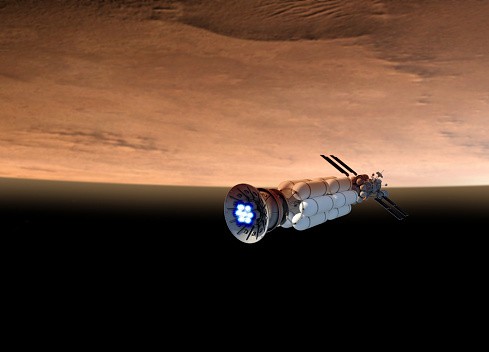
For many years, NASA has made space missions to Mars with the hope of preparing humans for possible colonization of the Red Planet. While this goal will mark a significant breakthrough, it can also jeopardize the health of astronauts as they get exposed to cosmic radiation.
Consequences of Long-Term Space Travel
A round trip to Mars and back is estimated to take approximately two years. During such duration of travel, the astronauts may get exposed to a large amount of a form of radiation which can damage their organs and DNA.
Galactic cosmic radiation (GCR) is considered the major source of radiation that must be dealt with during space missions within the Solar System. As heavy, high-energy ions are stripped of electrons, they can pass easily through a spacecraft or human skin.
It is known that kidneys are among the organs which are late to show signs of radiation damage. By the time it has become apparent, it may be too late to prevent failure and could be catastrophic for the success of Mars mission.
Experts are aware that space travel can cause several health issues for space travelers, such as bone mass loss and kidney stone development. However, only those who traveled to the moon were exposed to the full effects of galactic cosmic radiation, which lasted for less than two weeks. This means that until now, we still have no idea how GCR will affect the human body.
Cosmic Kidney Disease
A new research has revealed that astronauts on a Deep Space mission may not make it all the way to Mars and back without suffering from kidney failure. Although it is not usually considered as one of the main threats of space travel, a journey as far as the Red Planet can affect the structure and function of the astronauts' kidneys.
In the paper "Cosmic kidney disease: an integrated pan-omic, physiological and morphological study into spaceflight-induced renal dysfunction," a team of researchers has found that long-term spaceflight can lead to permanent renal damage. Led by Keith Siew from the Department of Renal Medicine of the University College London (UCL), the researchers conducted analyses using samples from spaceflight-exposed mice, humans, simulated microgravity rats, and simulated GCR-exposed mouse missions.
It was discovered that the kidneys of both mice and humans are "remodeled" by the harsh space conditions, which can change the way kidneys process salts. The combined effects of microgravity and galactic cosmic radiation can increase the likelihood of kidney stones. The team also found that the kidneys of mice exposed to space conditions equivalent to a two-and-a-half-year journey to the Red Planet were damaged permanently.
In terms of health issues, scientists have known what has happened to astronauts on short space missions. What they do not know so far is why such issues happen and what will be the consequences of longer space flights.
This means that astronauts might need dialysis on their way back to Mars if nothing is developed to protect their kidneys. The research authors stressed that these issues should be considered seriously before astronauts are sent to Mars missions.
RELATED ARTICLE : Low-Cost Mars Exploration Being Developed, Novel Ways to Gather More Data on the Red Planet May Be Possible Soon
Check out more news and information on Mars Mission in Science Times.
© 2025 ScienceTimes.com All rights reserved. Do not reproduce without permission. The window to the world of Science Times.











